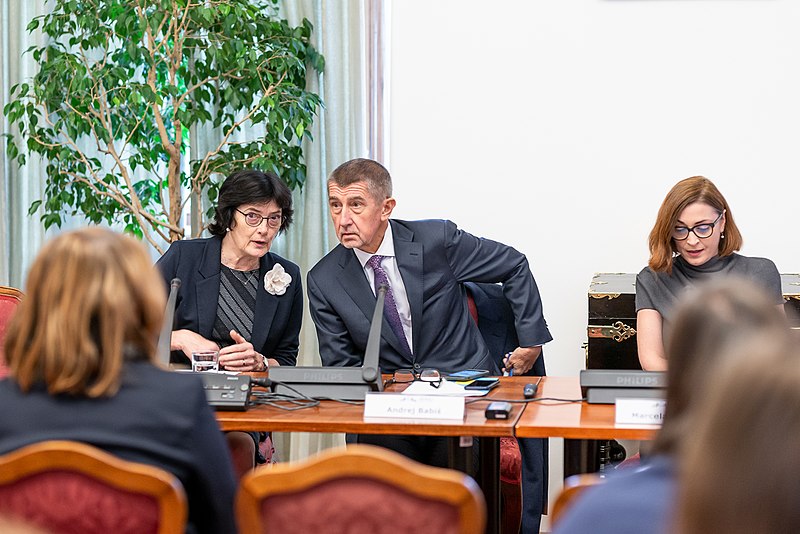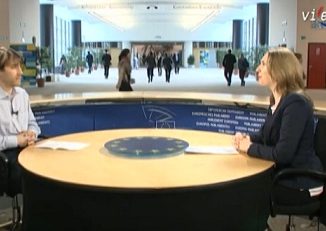
In a glaring failure for checks and balances, a leaked European Commission audit concludes that Czech Prime Minister Andrej Babiš continues to profit from his business empire. The billionaire premier is in conflict of interest under both Czech and EU law, say the EC auditors. The confidential report finds that some €11 million in subsidies has been wrongfully paid out to Agrofert, the agriculture, food and chemicals conglomerate that Babiš put into trust after coming to power in 2017. The EU seems set on making an example of the Czech PM. Will this mean a clampdown on corruption in Central Europe?
Background
Before Andrej Babiš took office in 2017 he consigned Agrofert to trust funds. But not only is he the beneficiary of the conglomerate’s profits, he still pulls the strings at Agrofert, finds the European Commission audit report. And of course as prime minister he has sway over the allocation of EU and Czech subsidies. The findings of the 71-page confidential report were published by several Czech media outlets in early December after the final version was leaked to the weekly Respekt, Czech Radio’s iRozhlas and daily Deník N.
Czech Radio’s news server iRozhlas is among the media outlets that claims to have seen the report. According to the audit, over the period investigated, Agrofert was wrongly allocated €11.18 million in subsidies, it reports. The conglomerate has cashed in on about half of this sum: just under €2 million was paid out by Brussels during the period investigated, while almost €4 million was paid to Agrofert from the state coffers in subsidies that were not ultimately reimbursed by the EU. The remaining €6 million refers to subsidies that were allocated but not paid out.
Payouts to Agrofert from the European Structural and Investment Funds, and later the Czech Agricultural Intervention Fund (SZIF), were stopped in the summer of 2019 pending the findings of the ongoing EC investigation. At that time a preliminary report by the auditors was leaked to the press.
SZIF, the body responsible for allocating direct payments in the Czech Republic, is now preparing to resume retroactive payouts to Agrofert. Under the Rural Development Programme subsidies were allocated to the conglomerate between February 2017 (when Andrej Babiš placed Agrofert in trust funds) and August 2018 (when the new EU Financial Regulation on conflicts of interest came into effect). Novinky reports that SZIF fears legal action by Agrofert if it were to withhold payouts without legitimate justification.
Under Czech legislation the Budgetary Rules Act (2000) prohibits the payout of subsidies in the event of a conflict of interest, SZIF spokesperson Filip Sova told news server Novinky. But the conflict of interest clause doesn’t apply to SZIF: since it doesn’t make payments from the cohesion fund, it is regulated by the SZIF Act (2000) and not the Budgetary Rules Act, he explained.
Sova described how SZIF acts as an accredited payment agency: “It requests reimbursement of the aggregate subsidies directly from the European Commission; in the case of the Rural Development Programme (with which the audit is concerned) by means of a quarterly request for payment.”
Fight to the last breath
Minister for Regional Development Klára Dostálová rejected the findings of the auditors’ report. She has vowed to “fight to the last breath” and take the matter to the European Court of Justice if necessary. It’s yet to be determined how much EU funding would have to be paid back by the Czech Republic. But the amount owed could be withheld by the EU from future payouts to the state, claimed Pavel Svoboda, former head of the European Parliament’s Committee on Legal Affairs (JURI), in an interview with iRozhlas.
The Ministry of Regional Development expects to receive the Czech translation of the audit report over Christmas, according to Deputy Minister for Regional Development Daniela Grabmüllerová, as reported in iRozhlas. The state will then have two months to respond to the auditors’ recommendations. Despite leaks to the media, the Commission intends to keep the report confidential pending an official response from the Czech Republic.
Lex Babiš
Premier Babiš denies any wrongdoing. When asked who will pay back the money – Agrofert or Czech tax payers – the prime minister told the daily Právo: “Firstly, I’m not in Agrofert. Secondly, I rule out the Czech Republic giving anything back. Truth is on my side. It’s illogical that Brussels would interpret Czech legislation.”
The Czech PM argues that he has acted in full compliance with Czech legislation on conflicts of interest, and specifically an amendment to the law that came into effect shortly before he took office in 2017. “Lex Babiš was drafted by Czech politicians with the sole purpose of targeting my person, and I put my former companies in trust funds, exactly according to this law,” the prime minister told Politico.
“We’re not Agrofert!”
In the same week the auditors’ report was leaked to the media, state prosecutor Pavel Zeman reopened a domestic investigation into alleged EU subsidy fraud concerning the Stork’s Nest farm and conference centre, which is part of the Agrofert conglomerate.
One of the loudest voices decrying the premier’s alleged conflicts of interest is A Million Moments for Democracy, the anti-Babiš movement that has been demanding the prime minister step down since he first took office. Up to 60,000 protesters braved the cold on Prague’s Wenceslaus Square on December 10, shouting “Resign! Resign!” and “We’re not Agrofert!” Smaller demonstrations were held in Prague and around the country the following week, including in the small town of Vodňany, home to Vodňanská drůbež, a massive poultry processing plant owned by Agrofert.
Babiš reassured his followers on social media he has no intention of resigning. “A normal person would have probably left by now. But not me. As it’s generally known, I’m a dogged beast,” he wrote in his weekly Facebook post, reports Bloomberg.
But the furore made for an awkward appearance by the Czech premier at the EU summit the following week, especially in view of his outlier position during climate negotiations that continued into the night.“I spent the whole evening alone,” he complained to news server Seznam.
The credibility of Europe is at stake
Misuse of EU funds is a thorn in the side for the European Parliament’s Budget Control Committee (CONT). During the December 17 plenary the committee questioned the Commissioner for Budget and Administration, Johannes Hahn, on the topic.
Although subsidies to Agrofert have been stopped, “the core problem is not solved,” contested Chair of the CONT committee Monika Hohlmeier (EPP group). She claimed taxpayers are continuing to pay for a failure to uphold the rule of law. Hohlmeier and a number of Czech MEPs showed their anti-Babiš stance by wearing Million Moments for Democracy badges during the parliamentary debate.
MEPs from the Czech Republic, Hungary and Romania were among those in Parliament calling for a crackdown on the land grabs and other abuses of power that allow high level officials to line their pockets with agricultural and cohesion funds. Embarrassingly for the EU, these so-called “Money Farmers” recently made headlines in a New York Times exposé.
The controversy surrounding the Czech PM is seen as a test case for addressing abuses of power in neighbouring countries. During the debate Rónai Sándor (S&D, Hungary) described Central Europe as a “world of oligarchs”, where “EU citizens pay twice for the damage”. Oligarchs are “systematically plundering the various EU pots,” railed Viola Von Cramon-Taubadel (Greens/EFA, Germany). “The credibility of Europe is at stake,” she warned.
Alexandr Vondra (ECR, Czech Republic) quipped that a single item on the agenda summoned a record number of Czech speakers, as his compatriots rallied to save their country’s good name. Czech MEPs highlighted the issue of transparency. Because the EC audit is being treated as confidential, they complained, the Czech government has not communicated the findings to the bodies responsible for paying out subsidies. As a result beneficiaries are being paid out of the Czech budget. Mikuláš Peksa (Greens/EFA, Czech Republic) on behalf of the CONT committee has called on the European Commission to publish the auditors’ report. In Parliament he criticised the muddling of Andrej Babiš’s fortune with state moneies in the discussion on how much should be paid back.
A modern form of feudalism
Another question for the Commissioner was how to prevent another “Stork’s Nest” from happening. If a capping threshold is introduced to help out small farmers, what’s to stop agri-giants from feigning a breakup to tap into subsidies? Jeroen Lenaers (PPE, Netherlands) portrayed small farmers as victims of regional development policy. “In some member states, EU support has created a sort of parallel economy, a modern form of feudalism,” said Lenaers.
In response to questions from MEPs, Commissioner Hahn defended the current monitoring mechanisms. Asked to provide assurances on the capping threshold going forward, he drew attention to the circumvention clause, and noted that high risk cases are audited. Hahn stated that the error rate is around 2%, and only a fraction of this represents actual cases of fraud.
A few bad apples?
“CAP is the lifeblood of European farmers,” said Sheila Ritchie (Renew Europe Group, UK). “The CAP no longer commands credibility,” she charged. Nicolaus Fest (ID, Germany) blamed a toothless EU: “In many areas the EU is a system which feeds into this cycle of corruption.” CONT committee chair Hohlmeier took issue with Fest’s remarks. It is a “small number of rotten apples who carry out large scale abuse of EU funding,” she retorted. Clare Daly (GUE/NGL, Ireland) challenged Hohlmeier: “The problem isn’t a few bad apples. The problem is the system itself.”
Since the parliamentary debate on December 17 it has emerged that Hohlmeier is to lead a delegation to protect the EU’s financial interests in the Czech Republic in February 2020, reports news server Forum24. Tomáš Zdechovský (EPP, Czech Republic) who will be part of the delegation called it “an important signal on the part of the European Union.”
With member states rocked by high level subsidies scandals, it’s a wise move for the EU to be seen to take the Czech premier’s conflict of interest seriously. The EU will likely get its money back. But is it prepared to fix a broken system of checks and balances to get its credibility back?







